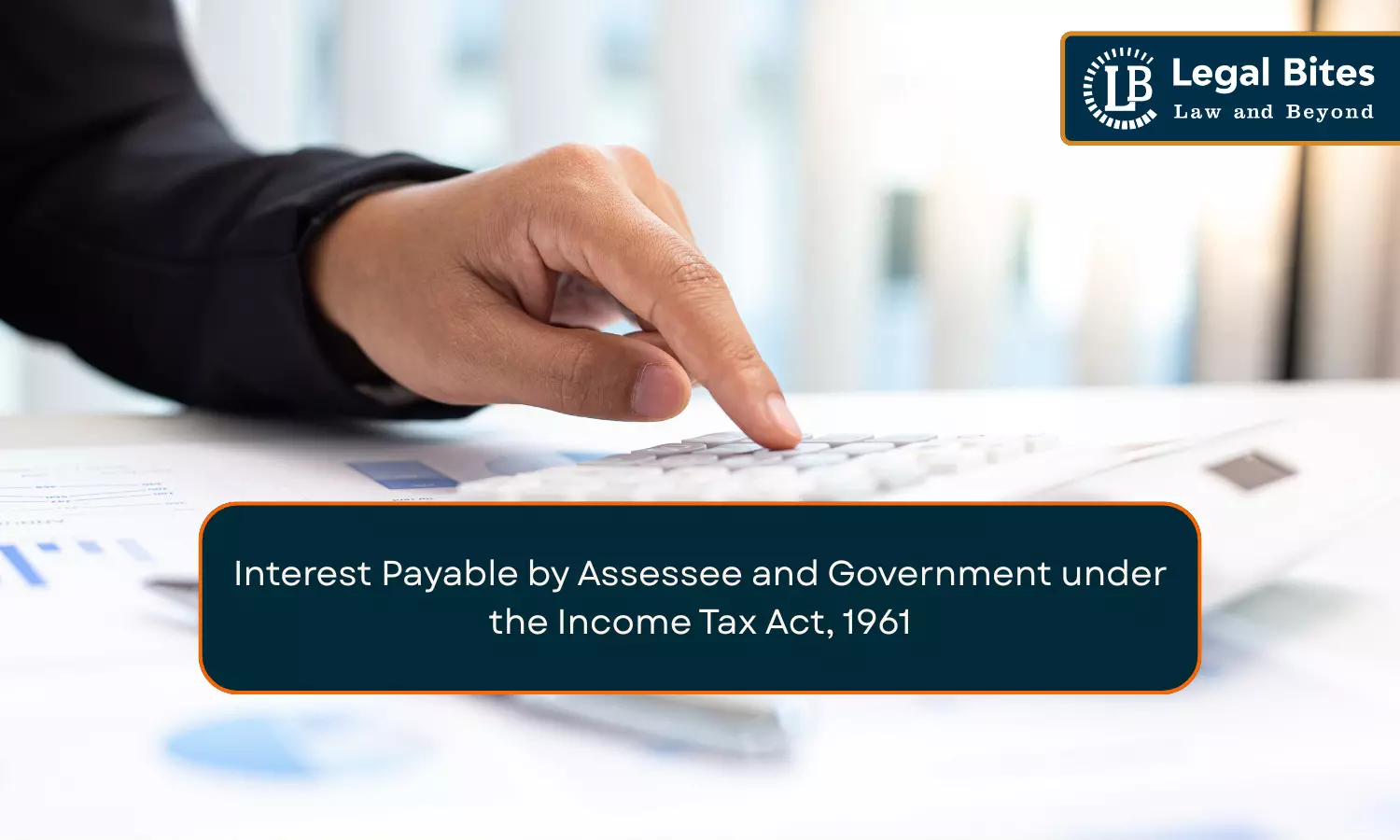Interest Payable by Assessee and Government under the Income Tax Act, 1961
The Income Tax Act, 1961 provides for interest on tax delays by assessees and mandates government interest on refunds for excess tax paid. Scroll down to read more!

The Indian Income Tax Act, 1961, not only provides for the imposition and collection of taxes but also prescribes provisions for the levy of interest in cases of delay or default. Interest serves as a compensatory mechanism rather than a penal one. Both the assessee and the government may be liable to pay interest under various circumstances. This article explores the statutory framework, judicial interpretations, and procedural nuances regarding interest payable by the assessee and...
The Indian Income Tax Act, 1961, not only provides for the imposition and collection of taxes but also prescribes provisions for the levy of interest in cases of delay or default. Interest serves as a compensatory mechanism rather than a penal one. Both the assessee and the government may be liable to pay interest under various circumstances. This article explores the statutory framework, judicial interpretations, and procedural nuances regarding interest payable by the assessee and the government under the Act.
Part I: Interest Payable by the Assessee
The Income Tax Act imposes interest liability on assesses primarily to discourage non-compliance and ensure the timely payment of taxes. The key sections are 234A, 234B, 234C, and 220(2).
1. Interest under Section 234A – Delay in Filing Return
Applicability: Interest is levied when an assessee fails to file a return of income within the prescribed time under Section 139(1).
Rate and Period:
- Simple interest at 1% per month or part thereof.
- Calculated from the due date to the actual date of filing the return.
Amount: Interest is levied on the amount of tax payable (after reducing advance tax and TDS).
Example: If the due date is 31st July and the return is filed on 31st October with ₹20,000 payable, interest = ₹20,000 × 1% × 3 = ₹600.
Dr. Prannoy Roy & Anr. v. CIT & Anr. (2002)
Delhi High Court held that interest under Section 234A of the Income Tax Act, 1961, is compensatory and not penal, and hence, cannot be levied where the due tax has already been paid before the due date for filing the return, even if the return itself is filed late.
The petitioners had paid their entire tax liability in advance but filed the return 11 months late, leading the revenue to levy interest under Section 234A. The Court emphasised the principle of purposive construction and ruled that since the revenue did not suffer any loss due to the timely tax payment, interest should not be levied merely due to the delayed return.
The Court also noted that interpreting Section 234A to impose interest despite full prior payment of tax would amount to introducing a penalty provision without statutory authority, potentially rendering it unconstitutional.
2. Interest under Section 234B – Default in Payment of Advance Tax
Applicability
Section 234B applies when:
- The assessee is liable to pay advance tax under Section 208, and
- Has either failed to pay any advance tax, or
- Has paid less than 90% of the assessed tax as advance tax under Section 210.
Rate of Interest
- 1% per month or part of the month
- Applicable for each month of default
Period of Interest
Interest is calculated for the period:
- From 1st April of the assessment year
- To the date of determination of total income under Section 143(1), or in case of regular assessment, up to the date of such assessment
In case of reassessment under Sections 147 or 153A, interest is also levied for the period ending on the date of reassessment.
Amount on Which Interest Is Payable
Interest is payable on:
- The shortfall between the advance tax paid and the assessed tax
Where:
Assessed Tax = Tax on total income (as per Section 143(1) or regular assessment)
Less:
TDS/TCS under Chapter XVII
Relief under Sections 90, 90A, and 91
Tax credits under Sections 115JAA or 115JD
Jt. CIT v. Rolta India Ltd. (2011)
The Supreme Court in Jt. CIT, Mumbai v. Rolta India Ltd. held that companies liable to Minimum Alternate Tax (MAT) under Section 115JA of the Income Tax Act, 1961 are also liable to pay interest under Sections 234B and 234C for failure to pay advance tax.
The Court rejected the earlier Karnataka High Court view in Kwality Biscuits Ltd., clarifying that Section 115JA/115JB is a self-contained code and MAT companies must compute and pay advance tax accordingly. Thus, interest is chargeable on the shortfall, even when tax is levied on book profits under Section 115JA.
3. Interest under Section 234C – Deferment of Advance Tax Instalments
Applicability:
Section 234C of the Income Tax Act, 1961 applies to:
All assessees (companies and non-companies) who are liable to pay advance tax under Section 208 and either fail to do so or pay less than the specified percentage by the prescribed dates.
Exemptions are provided for shortfall due to:
- Capital Gains.
- Winning from lotteries, etc. [Section 2(24)(ix)].
- First-time income from business/profession.
- Dividend income under Section 115BBDA.
- Increase in surcharge by amendment, if shortfall is paid by specified date.
Rate of Interest:
- 1% per month (simple interest) is levied on the shortfall amount.
Period of Interest Levy:
- For defaults in June, September, December: Interest is levied for 3 months each on the shortfall.
- For March: Interest is levied for 1 month on the shortfall from 100% of tax due.
Threshold Installments for Non-Corporate Assessees:
On or before 15th September – Minimum 30% of tax due.
On or before 15th December – Minimum 60% of tax due.
On or before 15th March – 100% of tax due.
Threshold Installments for Corporate Assessees:
15th June – 15%
15th September – 45%
15th December – 75%
15th March – 100%
(With tolerance of 3% i.e. 12%/36% as per the proviso)
CIT v. Smt. Premlata Jalani (2003)
In this case, the Rajasthan High Court held that interest under Section 234C of the Income Tax Act, 1961 is not leviable on the shortfall of advance tax relating to capital gains that arise after the due date of the last instalment of advance tax (15th March). Since the capital gains in question accrued post-15th March 2000, the assessee had no legal obligation to pay advance tax on such gains before their accrual.
The Court further clarified that under the proviso to Section 234C, interest for deferment can only be charged from the point at which the liability to pay advance tax arises, not before. The Revenue’s computation of interest for earlier months was held erroneous, and the assessee’s self-assessment for one month’s interest liability was upheld.
4. Interest under Section 220(2) – Non-payment of Demand
Applicability: If tax demanded in a notice under Section 156 is not paid within 30 days.
Rate and Period:
- Interest at 1% per month from the end of the 30-day period until payment.
Amount: On the outstanding amount specified in the notice.
5. Penalty and Interest for Failure to Deduct or Deposit TDS – Section 201 (Brief Overview)
If a person or company fails to deduct or deposit tax at source (TDS), they are treated as an assessee in default, unless the payee (resident) has filed a return, reported the income, paid due tax, and a CA certificate is furnished. In such cases, interest is still payable:
- 1% per month from the due date of deduction to the actual deduction,
- 1.5% per month from deduction to actual payment.
The unpaid tax and interest become a charge on all assets of the defaulter. No default order can be passed after 7 years from the relevant financial year.
Part II: Interest Payable by the Government
The Income Tax Act also ensures that the assessee is compensated when excess tax is collected and a refund is due. This is governed by Section 244A.
1. Interest under Section 244A – Interest on Refunds
Applicability: When an assessee is entitled to a refund of any amount.
Sub-sections:
244A(1)(a): Refund of advance tax/TDS – Interest @ 0.5% per month from 1st April to date of refund.
244A(1)(b): Refund due after regular assessment – Interest from the date of payment of tax to date of refund.
Amount: Interest is calculated on the amount of refund due.
Exclusions:
- No interest is paid if the refund is less than 10% of the total tax liability.
2. Interest Payable by Government on Excess Advance Tax - Section 7B
If a taxpayer pays advance tax under Section 7A during a financial year and the total paid exceeds the tax finally determined on regular assessment, the Central Government must pay simple interest at 15% per annum on the excess amount. This interest is calculated from April 1st of the following financial year up to the date of the regular assessment for that assessment year.
Union of India Through Director of Income Tax v. M/s Tata Chemicals Ltd. (2014)
The Supreme Court held that a resident/deductor who deposits tax under Section 195(2) of the Income Tax Act is entitled to interest on a refund if such tax is later found to be not legally due and refunded under Section 240. The Court rejected the Revenue’s argument that interest under Section 244A is limited to assessees and not deductors, clarifying that Section 244A(1)(b) covers “any other case” and includes such refunds.
The Court emphasised that retention of excess tax by the government obligates it to pay interest as compensation for the undue retention of funds. Thus, the resident/deductor was entitled to interest from the date of payment of the tax until the date of refund.
Conclusion
Interest provisions under the Income Tax Act, 1961, ensure equitable treatment of both taxpayers and the government. While interest levied on assessees acts as a deterrent against non-compliance, interest paid by the government compensates the taxpayer for excess payments. Both reflect the underlying principle of fiscal justice. However, disputes often arise over computation and delay, leading to considerable litigation. Hence, a robust understanding of these provisions is crucial for taxpayers and practitioners alike.
Note: In Budget 2025, there have been no changes to the provisions concerning interest payable by the assessee and the government under the Income Tax Act, 1961.
References
[1] Income Tax Act, 1961
[2] Dr. Prannoy Roy & Anr. v. CIT & Anr.,(2002) 172 CTR (Del) 465
[3] Jt. CIT v. Rolta India Ltd. [(2011) 330 ITR 470 (SC)]
[4] CIT v. Smt. Premlata Jalani [(2003) 264 ITR 744 (Raj)]
[5] Union of India Through Director of Income Tax v. M/s Tata Chemicals Ltd. [(2014) 6 SCC 335]

Ajay Kulkarni
Ajay Kulkarni completed his undergraduate studies at the University of Texas and earned his LL.B. from the Faculty of Law, University of Delhi. A qualified Company Secretary (CS), he specializes in Taxation Law with a keen interest in the evolving landscape of Indian and international tax regulations.
